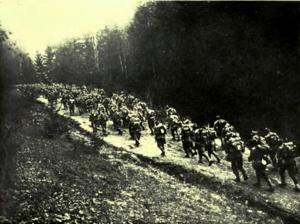
Back معركة ترانسيلفانيا Arabic ترانسیلوانیا دؤیوشو AZB Бітва ў Трансільваніі Byelorussian Битка за Трансилвания Bulgarian Batalla de Transsilvània Catalan Bitva o Transylvánii Czech Μάχη της Τρανσυλβανίας Greek קרב טרנסילבניה HE Erdélyi hadjárat (1916) Hungarian Ռազմագործողություն Տրանսիլվանիայում (1916) Armenian
| Battle of Transylvania | |||||||
|---|---|---|---|---|---|---|---|
| Part of the Romanian campaign of World War I | |||||||
 Romanian troops crossing the mountains into Transylvania | |||||||
| |||||||
| Belligerents | |||||||
|
|
| ||||||
| Commanders and leaders | |||||||
|
|
| ||||||
| Units involved | |||||||
|
|
| ||||||
| Strength | |||||||
|
27 August: 369,000[1] 18 September: Less than the Central Powers[2] |
27 August: 34,000[3] 18 September: >200,000[4] | ||||||
| Casualties and losses | |||||||
| Unknown | Unknown | ||||||
The Battle of Transylvania was the first major operation of Romania during World War I, beginning on 27 August 1916. It started as an attempt by the Romanian Army to seize Transylvania, and potentially knock Austria-Hungary out of the war. Although initially successful, the offensive was brought to a halt after Bulgaria's attack on Dobruja. Coupled with a successful German and Austro-Hungarian counterattack which started in mid-September, the Romanian Army was eventually forced to retreat back to the Carpathians by mid-October. The Romanian armies however managed to escape the Central Powers' attempts to completely destroy them. The Battle of Transylvania also caused the replacement of the Chief of Staff of the German Army and the shifting of German attention to the region, causing German offensive operations at Verdun to cease.
- ^ Holger H. Herwig, A&C Black, Apr 24, 2014, The First World War: Germany and Austria-Hungary 1914-1918, p. 211
- ^ Stephen Pope, Elizabeth-Anne Wheal, Pen and Sword, Nov 1, 2007, Dictionary of the First World War, p. 399
- ^ Holger H. Herwig, A&C Black, Apr 24, 2014, The First World War: Germany and Austria-Hungary 1914-1918, p. 211
- ^ Stephen Pope, Elizabeth-Anne Wheal, Pen and Sword, Nov 1, 2007, Dictionary of the First World War, p. 399
© MMXXIII Rich X Search. We shall prevail. All rights reserved. Rich X Search